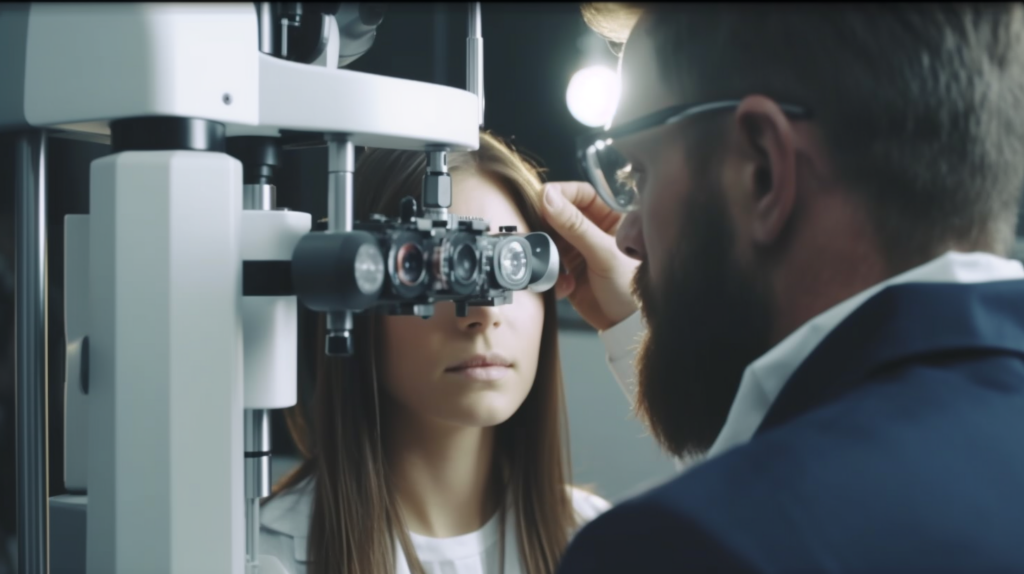Does Medicaid Cover Glasses and Eyes Exams?

Last Updated on January 25, 2024 by Lori Pace
Having explored Medicaid programs across various states, it’s important to note that the coverage for glasses can vary. While some states may not include glasses as a mandatory benefit, they often provide eyewear as an optional provision. However, it’s worth delving into the specifics, as certain circumstances can indeed lead to Medicaid covering the cost of new glasses.
Medicaid will pay for glasses for children and young adults, for example. If they are medically necessary by a doctor, Medicaid will cover glasses for adults of all ages. You will have to choose from a limited number of lenses if you are eligible for Medicaid.
Rest assured that Medicaid takes care of the essentials, including coverage for standard single-vision lenses. It’s important to note, though, that if you opt for premium lenses, there might be an additional cost involved. To embark on this journey of obtaining new glasses, your local Medicaid office is your ally. They can guide you to eye clinics that embrace Medicaid payments for eyewear. In fact, quite a few agencies provide online directories, simplifying the task of discovering eyewear providers in your vicinity who are part of the Medicaid network.
Who Qualifies for Eyeglasses Under Medicaid?
Navigating the landscape of who is eligible for eyeglasses through Medicaid involves considering various factors. One key aspect is the federal law that mandates Medicaid plans in all states to cover glasses for individuals under 21 years of age. This coverage typically falls under the EPSDT program (Early Periodic Screening, Diagnostic, and Treatment). Additionally, the coverage extends to adults in select states who have medical requirements. Notably, Mississippi, Minnesota, Alabama, and Minnesota are among the states where Medicaid extends eyewear coverage to all beneficiaries, irrespective of age.
Adults who have had eye surgery can get glasses through the Medicaid programs in Colorado, West Virginia, and Oregon. However, Medicaid programs in Nevada or North Carolina do not provide eyewear for adults.
When Does Medicaid Pay for Glasses?
If a doctor considers that glasses are medically necessary, Medicaid will pay for them. Medicaid covers the following aspects: Glass Fittings, Frames, Lenses, Repairs, Replacements
Medicaid typically pays for one pair per year. Even so, if you are under 21 and not eligible for Medicaid, you can purchase two pairs of replacement glasses each year. On the other hand, Medicaid will not replace glasses if the glasses are lost, damaged, stolen, or lost.
What’s The Extent of Medicaid’s Coverage for Glasses?
Diving deeper into the matter, it’s essential to bear in mind that each state tailors its vision benefits within the Medicaid framework. While Medicaid generally encompasses glasses that are medically necessary, the criteria can vary.
Some states deem glasses essential for addressing specific conditions, like diseases or infections. Meanwhile, in certain cases, even if glasses aren’t strictly classified as medically necessary, some states extend coverage for the expenses tied to eyewear.
Which Lenses that Medicaid cover?
Understanding the scope of lens coverage under Medicaid is essential before seeking a new pair. Let’s delve into the specifics. Broadly speaking, Medicaid encompasses coverage for standard single-vision lenses that address both near and distance vision needs. Moreover, if you require bifocals or trifocals, Medicaid has provisions in place to assist. However, it’s crucial to be aware that while Medicaid extends coverage for these lenses, there are limitations in terms of the frequency of coverage.
However, Medicaid covers only one pair of trifocals or bifocals per year because they are costly. Besides, Medicaid covers single-vision glasses for two per year, as they are relatively inexpensive.
Some lenses are not covered by Medicaid, such as Transition lenses, Oversized lenses, Progressive multifocal, and No-line bifocals or trifocals. Even so, you can still get Medicaid coverage if you want to purchase any of these lenses. Notice that as these are specialty lenses, you may have to pay out-of-pocket expenses.
Which Eyewear Providers Accept Medicaid Cover?
Having navigated the process myself, I’d recommend starting by checking your Medicaid insurance card. This card holds the key to connecting with the agency that oversees your Medicaid plan. The contact details and website mentioned on the card serve as your entry point to finding eye care providers who are part of the Medicaid network.
To find a list of eyewear providers and doctors who accept Medicaid, visit the agency’s website. The website will provide a list of eyewear professionals in your area who accept Medicaid.
For those craving more detailed information, you’ll be pleased to know that the KFF (Kaiser Family Foundation) provides a Medicaid Benefits Database. Within this resource, a wealth of information awaits to shed light on the scope of eye services covered by your Medicaid plan, along with the specific nuances in each state. While the KFF database serves as a valuable guide, remember that the ultimate confirmation of specific details should come from the agency administering your individual Medicaid plan.
How Can You Take Advantage of Vision Benefits Under Medicaid?
Optimizing the vision benefits offered by Medicaid demands a strategic approach. Suppose you’re dealing with vision concerns and your Medicaid plan includes glasses coverage. In that case, it’s advisable to kickstart the process by seeking a referral from your primary healthcare provider. This referral will pave the way for your visit to an ophthalmologist, a specialist in eye care.
Ophthalmologists treat eye conditions by diagnosing and treating them. They can also prescribe eye medication, contact lenses, and glasses. You can’t use your Medicaid vision benefits to see an ophthalmologist. These visits are covered under your standard Medicaid insurance, as well as expert medical care.
Meanwhile, your vision benefits can pay for eye exams and diagnoses. You can visit an eye doctor to learn more about how you can use your Medicaid coverage.
Some eye care professionals won’t accept Medicaid as payment. However, they may be able to refer you to others who do. Visit Benefits.gov if you are unable to find an eye doctor who accepts Medicaid. After you have opened the page, you will be able to filter the information by category (Medicaid and Medicare) in order to find the contact details of nearby eye care professionals.
Does Medicaid Cover Eyeglasses? Yes, but…
Navigating Medicaid’s Coverage for Eyeglasses: Yes, but… Unraveling the intricacies of the Medicaid program and the specifics of your individual plan can indeed be a bit perplexing, especially when it comes to understanding what falls under coverage. Yet, here’s the assurance you need: Medicaid does extend coverage for both your glasses and the necessary eye exams to confirm their need.
Remember, the landscape of Medicaid coverage is a patchwork that varies across states. To gain clarity about whether your specific plan includes eyeglasses, a visit to your local Medicaid office is your best route. Engaging with a representative there will provide insights on how you can harness your Medicaid plan to its fullest potential.








